Decades ago, there were nearly 30 commercial pear packing companies in Medford, Oregon. The number dwindled to nine in the 1990s, and down to three, plus a few small grower-packers, in the mid-2000s. Today, there’s only one commercial packer left, not counting the Harry and David fruit mail order company.
“We’re essentially the last man standing, the last commercial packer in Medford,” said Mike Naumes, president of Naumes, Inc.
Naumes is a family-owned grower-packer, with tree fruit acreage in three states and another packing facility in California. About a quarter of the fruit packed by Naumes at the Medford headquarters comes from outside growers, several of whom use their own boxes and labels.
These days, Naumes leases packing and storage facilities from Southern Oregon Sales, a growers’ cooperative in Medford that gradually lost its membership and production base. Naumes also packs fruit for Associated Fruit, another long-time grower-packer that closed its packing facility but still has orchards.
For many years, several orchardists like Ron Meyer of nearby Talent, had small packing lines, but Meyer dismantled his packing line a few years ago and now sends his fruit to Naumes. Other small growers ship their fruit to packing companies in Hood River, Oregon. Besides Naumes, gift packer Harry and David still packs a small portion of its fruit after the gift season for the wholesale market.
Packing houses in Medford faced several whammies in the late 2000s—high fuel prices, tough pear markets, and a national recession. When fuel prices rose sharply several years ago, it became difficult to entice truckers to pick up partial loads from the remote Medford region.
The Naumes company responded by making their fruit more accessible and delivering pallets of fruit to centrally located pickup sites in Washington, Oregon, and California. “The pickup sites do add to our costs because we have to pay storage, but that’s become a cost of doing business for us,” said Mike.
Packing technology
The main Naumes packing house in Medford has two lines—one specially designed for tender-skinned Comice and one for other pear varieties. The packing line for Comice is shorter, runs slower, and uses a flat belt instead of brushes. Pears are presorted on the line to separate small, unpackable fruit. The small fruit are sent to processors.
A computer touch screen in the packing line control room controls the electronic weight sizer developed by MAF/Linx. The technology can size three grades of fruit at once, so packing house workers only sort for fruit quality. Mike said that they don’t use internal sorting technology because he’s yet to find technology that works effectively on pears.
Traceability is an important component of the Naumes packing technology. A sticker on each box tells who packed the fruit, grower lot, variety, size, and grade. A scanner reads the sticker data and tallies the work of each sorter, enabling sorters to be paid by piece rate.
Cold storage
At harvest, they store most of the Bosc in controlled-atmosphere rooms for later packing. Their goal is to pack and ship pears first from their California operation before moving Medford pears out of CA rooms for packing.
Their last Bosc pears in Medford usually come out of CA rooms in early April. Most of their d’Anjou pears are exported and are cleared out by January. They don’t use CA for d’Anjous. There are five CA rooms at the Naumes headquarters and another eight in the Rogue Valley.
This is the second year Mike Naumes has participated in postharvest research using electro-thermofogging to apply fungicide to bins of pears in cold storage rooms. Eight rooms were fogged this year as part of a research project conducted by Oregon State University’s Dr. David Sugar. Naumes is also experimenting with two different rates of SmartFresh (1-methylcyclopropene) in four CA rooms.
In the first year of the research, Sugar reported that the thermofogging, applied by Pace International, reduced gray and blue molds by 25 percent using the fungicide Penbotec (pyrimethanil). Data from the 2013 crop year are not yet available.
Gift fruit
Pear packing in Medford is based on three grades—gift, U.S. No. 1, and U.S. Fancy. The gift grade reflects the influence that Harry and David has on the local pear industry. Fruit that are perfect—or almost—make the gift grade. Harry and David accept only two sizes.
For Comice pears sold to Harry and David, fruit are double-wrapped with tissue to help cushion fruit in the box. Because Comice are picked at 10 to 13 pounds of pressure, they are prone to depression marks caused by other fruit in the box during shipment, Mike explained.
Some Comice customers want each pear packed individually in netted socks, some want foam trays, Euro cartons, and even double lids. “Comice can become a very expensive pack,” he said.
Naumes has its own gift fruit program and offers sales of gourmet fruit, food gifts, and a monthly fruit club through the Internet. The gift fruit sales are part of its “Donate Fruit” program in which Naumes matches each pound of fruit sold through its gift division with a donation of fruit to food banks across America. Since creating the program in 2009, Naumes has contributed more than 11 million pounds of pears to help feed the needy.
Naumes has worked to expand its market reach by developing a marketing alliance with Wawona Orchards, a stone fruit grower-shipper near Fresno, California. “Wawona doesn’t grow pears, and we don’t grow peaches, nectarines, and plums,” said Mike. “By teaming our sales staff with Wawona, we both expand our product supply and market reach.” •

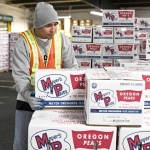
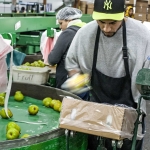
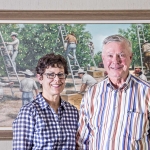
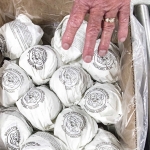
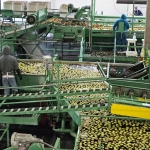
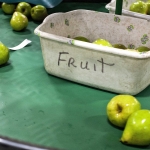
Leave A Comment